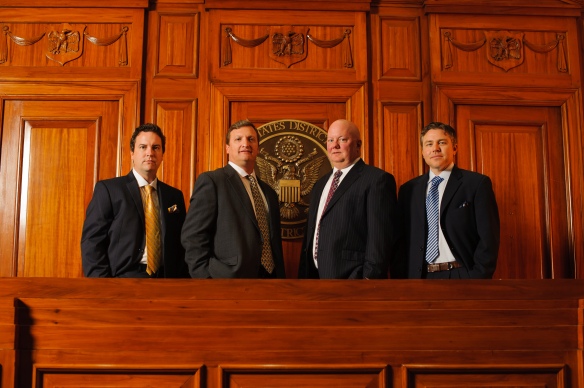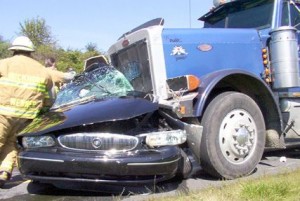
Pictured from left to right: Tab E. Lawhorn, Daryl L. Derryberry, Guy I. Wade, III and Craig D. Zips “Keeping Your Community SAFE One Case At A Time”
On Feb. 17, 2016, plaintiff Wanda Huddleston, 79 and retired, was northbound in a Chevrolet Silverado pickup truck on U.S. Highway 69 near Lindale, Texas. Handrijono Oetomo (“Oetomo”), an employee of DAT Truck Lines Inc. (DAT”), was southbound in an 18-wheeler owned or leased by HNL Truck Lines Inc (“HNL”). It was early morning and dark, and traffic was heavy. Oetomo attempted a U-turn in an open intersection, and Huddleston struck the 18-wheeler. She sustained multiple injuries and later had multiple strokes, which caused her to become mentally incapacitated. The investigating officer gave Oetomo a ticket for failing to yield the right of way.
Huddleston’s son, on her behalf, sued Oetomo, DAT and HNL for Oetomo’s actions in negligently making an unsafe U-turn, failing to yield the right of way and failing to keep a proper lookout. He also sued DAT for violating numerous policies and procedures and Federal Motor Carrier Safety Administration (FMCSA) regulations by not giving Oetomo any driver training, not disciplining him for driver log violations, not suspending him after he was given a citation, and not making a determination of whether the accident was preventable. The plaintiff sued HNL on theories of vicarious liability, alleging that Oetomo was a statutory employee of HNL.
Oetomo took no responsibility for the wreck and blamed Huddleston, in part, because women have slower reflexes.
Plaintiff’s counsel argued that Oetomo was lost and unfamiliar with the area and that he was in a rush, and that he falsified his logs. The truck’s data recorder said the truck had been operating for more than 13 hours, but Oetomo’s handwritten logs said he had been driving for only 7.25 hours.
Plaintiff’s counsel further argued that, under FMCSA regulations, because Oetomo did not understand English well enough, he should not have been driving the vehicle at all.
The defense argued that Huddleston was contributorily negligent for driving too fast, not keeping a proper lookout, not controlling her speed, and not braking or turning in time to avoid the collision. The defense accident reconstruction expert opined that Huddleston should have been able to see the truck and stop before the impact. An eyewitness who was behind Huddleston was able to stop, the defense noted.
HNL further argued that the truck was not a listed vehicle under its insurance policy and that it therefore had no insurance coverage. (Plaintiff’s counsel argued that, because the policy had a particular endorsement, known as an MCS-90 endorsement, the carrier would have to pay any eventual judgment against Oetomo and HNL.)
Huddleston sustained a leg fracture and a subdural hematoma. She claimed that the accident caused two to three debilitating strokes, as well.
She underwent open reduction and internal fixation (“ORIF”) of the fracture, with placement of pins and screws. For the subdural hematoma, she underwent a craniotomy.
As a result of the strokes, she required 24-hour care and had to move into a nursing home. Plaintiffs’ neurology expert opined that the strokes were related to the accident.
Huddleston sought past medical bills of about $315,000, as well as $918,000 for the present value of her life-care plan. She also claimed past and future physical pain, mental anguish, physical impairment and disfigurement.
The defense neurology expert opined that strokes resulted from pre-existing conditions, not from the accident.
The case settled for a total of $1,400,000. DAT and Oetemo settled on Sept. 16, 2016, for their policy limit of $1 million, paid by their carrier. HNL settled at mediation on March 6, 2017, for $400,000, paid by HNL’s carrier. HNL’s policy limit under the MCS-90 endorsement was $750,000.
TO STAY UP TO DATE WITH THE LATEST LAW NEWS, BE SURE TO FIND US ON FACEBOOK AT https://www.facebook.com/dzwlaw AND FOLLOW US ON TWITTER AT https://twitter.com/DZWLAW and https://twitter.com/URHURT
DERRYBERRY ZIPS WADE LAWHORN, PLLC


